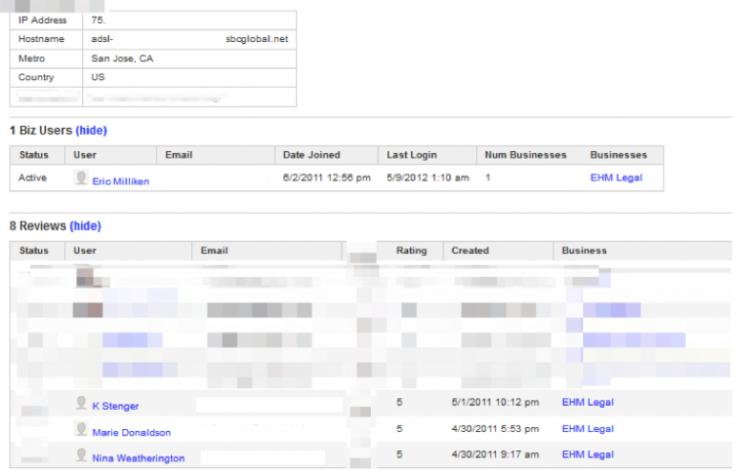Yelp Fights To Avoid A ‘Blackfish’ Moment: Documentary Kickstarter Puts Tech Firm On Defense

If there is a lesson to be learned from the movie “Blackfish,” it’s this: Don’t wait until the premiere before you plan your defense. Since its release in 2013, the scathing documentary about the treatment of killer whales in captivity has proved devastating to the reputation and bottom line of SeaWorld Entertainment Inc., despite the Orlando, Florida, company’s best efforts to counteract the effect of the film.
Yelp Inc., the San Francisco online review giant, is determined not to swirl down the same drain, and it has come out fast and fierce against a forthcoming documentary, “Billion Dollar Bully,” that promises to take aim at its business practices with interviews from small-business owners who say Yelp manipulates its reviews to favor advertisers and punish non-advertisers.
Although the low-budget movie is only halfway completed, Yelp this week went public with evidence it says proves a conflict of interest on the part of the San Francisco filmmaker behind the project. Kaylie Milliken, Yelp says, created three Yelp accounts in 2011 and posted fake five-star raves to boost the rating of her husband’s law firm. These “sock puppet” reviews were caught by Yelp’s automated filter -- proof, according to Yelp, that its recommendation software works as it’s supposed to.
In an unusual move, Yelp provided a screenshot of its backend system to International Business Times, which shows activity from a single IP address, and the three accounts and emails associated with them. One of the emails is the same one used to register the domain for Milliken’s production company, Prost Productions. One of the aliases, “ninabway,” has also been used to promote the Kickstarter project on Reddit.

Reached by phone, Milliken admitted posting the five-star reviews, but she said they were based on her real experiences -- she said she employed her husband’s legal services when the two were still dating. Yelp said the multiple accounts using different pseudonyms show Milliken has a history of trying to mislead consumers.
TV Showdown
But Yelp’s damage control didn’t stop there. On Monday, Yelp sent Shannon Eis, its vice president of corporate communications, to CNBC’s “Fast Money,” where she went head to head with Milliken. Eis accused Milliken of ignoring the mountains of evidence that, according to Yelp, has long since discredited allegations of extortion, including a Harvard Business School study, a Federal Trade Commission investigation and numerous court cases in which federal judges found no evidence of wrongdoing.
“Dismissing all of that seems a little weird,” Eis said of the film, “when all of it has exhaustively debunked the claims.”
It’s a proactive strategy to be sure, but Jonathan Bernstein, of Bernstein Crisis Management in Monrovia, California, said Yelp isn’t doing itself any favors. After watching the segment, he said the tech firm made a number of classic crisis-management mistakes, including drawing attention to a project that may turn out to be nothing at all.
“The fact that a company that large would be apparently scared of a documentary even before it comes out produces a lot of smoke,” Bernstein said. “When people see that much smoke, they assume there’s fire.”
On the CNBC show, Eis said Yelp was acting out of facts, not fear. But Bernstein said facts don’t address feelings. Whether true or not, the allegations against Yelp reflect real frustrations from business owners, many of whom are struggling just to make ends meet. Bernstein said the CNBC segment made Yelp appear unsympathetic to the plight of the little guy. “When you’re dealing with a sensitive issue of any type, the goal of a spokesperson is to come off as compassionate and confident,” he said. “Instead, she launches into trying to beat the documentary-maker over the head with her version of the facts.”
Lessons From Orlando
In its response to the fallout from “Blackfish,” SeaWorld has left no PR strategy untried. It has released point-by-point rebuttals, taken out full-page ads in the New York Times and even allegedly manipulated a public perception poll in its favor. It recently announced a new marketing strategy aimed at courting middle-of-the-road consumers, but neither its attendance nor its stock have shown signs of recovery.
Yelp appears to want to get ahead of the curve. Part of the impetus for its response to “Billion Dollar Bully,” according to Eis, was that Milliken is now raising money on Kickstarter to complete the project, which will only serve to further what Yelp asserts are falsehoods about its practices. Last week, when Milliken announced the fundraiser, Yelp shares dropped more than 4.5 percent, as Reuters reported. Shares rebounded this week after an analyst from Wunderlich Securities said it didn’t appear from the film’s trailer that Milliken has uncovered any new or incriminating evidence. The analyst compared Milliken to Michael Moore, and not in a good way.
Evidence or no, Yelp’s business model hinges on the trustworthiness of its reviews. Although Yelp has never been shy about dismissing extortion claims as “conspiracy theories,” it has long admitted in company filings that negative publicity about its technology, products or sales practices could harm its brand.
At last check, “Billion Dollar Bully” had raised more than $42,000 from 353 backers. Milliken said Tuesday that many of those backers were people who claim to have had negative experiences with Yelp, and that assessment is indicated among the comments on Milliken’s Kickstarter page. A common complaint of Yelp is that a single negative review can tarnish a business’ reputation indefinitely, and many commenters appear to be delighting in the irony that Yelp’s own reputation now hangs in the balance.
“A lot of people are contributing because they feel like it’s a chance for their side to be told,” Milliken said. “They have a desire to make sure the film is completed.”
Christopher Zara is a senior writer who covers media and culture. News tips? Email me here. Follow me on Twitter @christopherzara.
This article has been updated with input from Yelp regarding the backend screenshot, which shows activity from a single IP address.
© Copyright IBTimes 2024. All rights reserved.






















